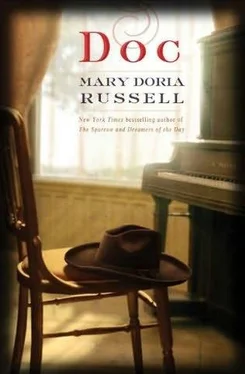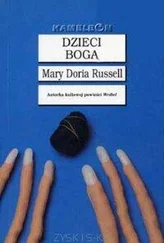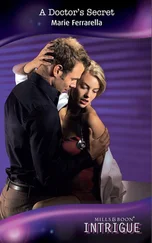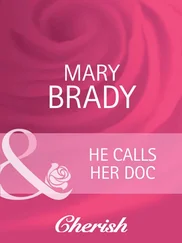Unless him and Wyatt and James wound up moving to the Arizona Territory, that is. Morg would have to give the book back to Belle before the Earps left Dodge.
“There’s no end of silver down by Bisbee and Tombstone.” That’s what Virgil’s last letter said. The veins were so rich, the metal was right out on the surface, the way gold was in California back in ’49. So Wyatt and James were talking about how if they all went down to Arizona right now, the Earps could get in on the ground floor of something big, instead of showing up a year late, when the big money was done.
Bessie wasn’t real happy about the notion. And Morg hadn’t actually agreed to the plan yet, either. Lou wanted to go up to Utah to see her family again and find out if her folks had softened any about her and Morg getting married. So Morgan was caught in the middle, because he didn’t want to say no to Lou but James was ready to pack, and Wyatt was edgy and restless and not inclined to what Doc called “rational argument.”
For Wyatt, autumn meant the end of the cattle season, and that meant he’d be laid off again. The injustice of it ate at him, and his temper shortened with the days. Dodge was down to half a dozen herds a week, and the city had already let John Stauber and Jack Brown go. Wyatt had a big argument with Mayor Kelley over that. Sure, the number of cowboys was down, but so was the quality. These were men nobody wanted to hire, peak season, and they joined idlers who’d been fired or quit work the minute they hit town: drunks and shirkers and troublemakers who couldn’t be bothered to ride back to Texas. It was no time to cut police staff, but that’s what the city council wanted, so that’s what happened. And then Chalkie Beeson and the other saloon owners grumbled that Wyatt was bashing extra cowboys and hauling them in on the smallest pretext so he could rack up arrest fees before the winter, but all the deputies shared that money, so it wasn’t like Wyatt was making anything extra in October. He just didn’t have any patience with idiots this time of year. About the only thing that cheered Wyatt up was going to the Elephant Barn to spend time with Dick and Roxana, working them in a circle corral or taking one of them out for exercise.
Every time Morgan thought about what Doc had done, he could feel himself getting a big, dumb smile on his face. Good thing, too, because it made him more tolerant when Doc got himself into trouble.
The little German kid who pumped the foot drill for Doc—Wil Eberhardt, his name was—he’d taken to keeping an eye on the dentist when Doc was gambling, even if it meant staying up all night, or sleeping in a corner of a saloon. When a bartender noticed things getting out of hand, he’d send the boy to find Morgan, and Morg would have to stop whatever he was doing and go on over and settle everyone down some. That was happening a lot lately, so Morg knew what it meant when Wil came running over around two in the morning, calling, “Mr. Earp! Come quick! There’s trouble at the Lady Gay!”
Didn’t take long to get to the bar. Front Street wasn’t near as crowded as it had been even a couple of weeks ago, but the mood was worse. Spring carousing was celebratory and pretty good-natured; at the end of the season, knots of drunks stood around outside, passing bottles and glaring. There was more sullen defiance about the city ordinances and a greater willingness to pick fights just for the hell of it. The crib girls hated October. It was a lot more dangerous and they were more likely to get cheated, so they stole more. Usually they were too plastered to do that without getting caught and they got smacked around for it. Even at James and Bessie’s, there was trouble almost every night.
So Morg figured that Doc was probably getting roughed up, but when he got to the saloon, it was quiet except for some young drover who was noodling around on the piano, trying to pick out a tune that might have been “Lorena” or maybe “Bonnie Blue Flag.” Or “Buffalo Gals.” Hard to tell.
Doc was just sitting at a table, playing poker. True enough, the other fellas looked pretty unhappy. Well, that’s what makes it gambling, Morg thought. Not everybody gets to win.
Brows up, Morg turned back toward Wilfred, who was peeking underneath the swing doors, afraid to come inside. “Ask him,” Wil mouthed, and pointed toward Kevin Ballard, who was wiping up beer slops but watching Doc and the cowboys.
“Hey, Kev,” Morg said quietly. “What’s the trouble?”
“Morg,” the barkeep whispered, “God knows I’ve seen men drink, but Jesus … And he keeps winning! They’re going to take it out of his hide, the way he’s been mouthing off at them.”
Morgan approached the table, but leaned against the wall to watch the action for a while. He didn’t have to listen to the muttering for long. Kevin and the Eberhardt kid were right. Doc was riding for a fall.
Pushing away from the planks, Morg scuffed over and stood across the table from Doc. “Cut your losses, boys,” he told the Texans. “Go have some fun with what you got left.”
Doc leaned back in his chair and stared at Morgan while the cowboys gathered up the remains of their wages. They indulged in a certain amount of unpleasant commentary about Dodge in general and about Doc in particular, but they went quietly, happy enough to quit the game while they still had money for another go at the girls.
It was a cool evening, but Doc was sweating.
“Doc, are you all right?” Morg asked. “You don’t look so good.” He meant it kindly, but the moment he said it, he knew Doc was going to take it wrong.
“Why, thank you, sir,” Doc said, cold-eyed. “How charmin’ of you to point that out. You, of course, are the very picture of rude health, which evidently entitles you to interfere with the livelihood of others, you arrogant, meddlin’ sonofabitch.”
Morg had heard plenty of that kind of thing come out of Doc’s mouth, but this was the first time he’d been the target himself, and it was a shock to be spoken to like that. Virgil took no guff and would have cracked Doc for it. Wyatt was tolerant of back talk as long as it stayed talk; he’d have shrugged it off and walked away.
Morg sat down and glanced at the bottle on the table. It was three-quarters empty. “Hitting it pretty hard tonight,” he observed.
“And precisely how is that any business of yours? Was there an election I missed?” Doc asked. “Has temperance come to west Kansas? I have not created a disturbance. Am I in violation of some new city ordinance?”
“No, Doc, but we’re friends—”
“Well, get off me, then!”
Doc reached for the bottle. Morg got to it first. That alone was a sign of how much Doc had put away. Morg meant to move the bottle just out of reach, but a hand clamped over his wrist.
“Leave it,” Doc warned.
Morg let loose, a little startled by how strong Doc’s grip was.
Doc refilled his water glass and damn near drained it.
“Damn,” Morg whispered. “Jesus … What’s wrong , Doc?”
Certain that if he were to move at all—even slightly, even to speak—everything human in him would be lost to blind, bestial, ungovernable rage, John Henry Holliday sat silently while in the coldest, most analytical part of him, he thought, If I go mad one day, it will be at a moment like this. I will put a bullet through the lung of some healthy young idiot just to watch him suffocate. There you are, I’ll tell him. That’s what it’s like to know your last deep breath is in your past. You won’t ever get enough air again. From this moment until you die, it will only get worse and worse. Bet you could use a good stiff drink now, eh, jackass?
So he let Morgan Earp wait for his answer, just as he himself waited—patiently, helplessly—until he could be sure that the liquor had taken hold, and he could feel himself inch back from the edge of the abyss. And when at last he spoke, his voice was soft and musical. “Flaubert tells us that three things are required for happiness: stupidity, selfishness, and good health. I am,” he told Morgan, “an unhappy man—”
Читать дальше












